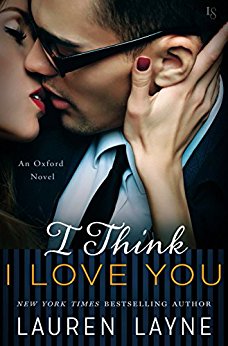 There are some authors that you know you smile reading, and Lauren Layne is one of those for me. In the interest of honesty, I’ll admit that occasionally I’ll cover my mouth when reading near my husband because I don’t want to hear any derisive remarks about the creepy but ecstatic smile on my face. (This is all very normal, right? Right.) Layne’s latest, I Think I Love You, is the friends to romance read that you’ve been waiting for. It’s scintillating and joyful, witty and sweet; a celebration and a goodbye. This book picks up the story of Brit and Hunter, employees at Layne’s famed Oxford magazine and also best friends. When the book opens, Brit has been dumped again, and she determines that it’s because she’s too much of a friend to her dates. She feels more sweet than sexy, less seductive than girl-next-door one-person-welcome-committee. In true, amazing rom-com fashion, Brit decides that the answer to her problem is lessons in seduction. Who better to teach her than her best friend Hunter—a Missouri transplant who is hot, successful with the ladies, and a good listener? (Also, he has glasses. Insert any excited face emoji here.) In a refreshing take on the friends-to-lovers trope, there isn’t a case of long-held unrequited love here. Neither character is initially attracted to the other, and that makes their delicious, sultry slide into romance even more appealing. Of course, we can see that they’re perfect for each other, and so can the assorted other Oxford and Stiletto characters we’ve fallen in love with over the years who make an appearance in this final book in both series. There’s so much to love about this effervescent read: a true and lasting friendship that’s sweetened and sexified (that’s a word, right?). A family of supporting characters who intervene in every way possible—and remind us of their own wonderful love stories. And a giant HEA that made it a little—and I mean a little—easier to accept that there will be no new characters added to this series. Pssst! If You Like This Book, Try: Any, and I mean any, of Layne’s other books. She’s a national treasure. Some of my other contemporary favorites are Lauren Blakely and Kate Meader. And I just read and adored my first Emma Chase novel, Overruled, so go ahead and pick that up too. I was given an ARC of this book from Netgalley, but all opinions provided are my own.
0 Comments
If you know someone who scoffs at romance novels—or God forbid, you are the scoffer—I’d point them toward the nearest Sarah MacLean book. Tell them to park themselves in their comfiest seat—preferably a couch that sucks them in and is difficult to rise from—nibble on their favorite snack, ignore their children/pets/laundry/other responsibilities for several hours and just get lost.
Sorry. I just got captivated by my own fantasy for a moment. Sarah MacLean doesn’t just know how to write beautiful romance. She’s a beautiful writer, period. Her books are filled with drama and action and yes, physical attraction, but they also have the prose of epics. There’s the looming, and yet, not didactic, sense that her characters matter, that you won’t just read about two people falling in love, but about betrayal and violence and redemption and saving grace. Wicked and the Wallflower picks up with some of the characters from MacLean’s The Day of the Duchess, namely Felicity Faircloth and Devil. Felicity and Devil come from markedly different lives, but they’re both searching for acceptance of some kind, even if they won’t admit it. Felicity is looking for a husband. She’s a “plain” member of the aristocracy who has been implicitly rejected by them, and as she tells Devil, she wants to be embraced again. Devil is a bastard son of a Duke who has had to do desperate things in order to get to the financially successful place he is today. He’s the ruler of Covent Garden and he controls it all with the help of his brother, Whit, his cane, and his fists. Neither character is quite what they seem. Felicity is a lockpick, who, thanks to her spinster status, has quite a degree of freedom. She also has a keen sense of adventure that leads her across London and to the forbidden nooks and crannies of Devil’s home and warehouse. From the beginning, it’s clear to the reader that she doesn’t belong with the cruel group of aristocratic friends she wants to return to—she’s kind, unconventional, and spirited, and their world is too small for her, even if she doesn’t see it yet. And Devil may occasionally use violence to reinforce his reign in Covent Garden, but he’s also tender and loving, once the right woman gets past his defenses. Their attraction to one another is complicated by the fact that Felicity has landed herself a Duke by lying and claiming that she has landed a Duke, and said Duke happens to be Devil’s bastard brother, the man whom Devil plans to ruin. Unfortunately for Felicity, Devil’s plan includes ruining anyone the Duke plans on marrying and having children with, and thanks to Felicity's lie, that specifically includes Felicity. Oops. Through the book's tension between dark and light, Covent Garden and Mayfair, bastard and legitimate aristocrat, MacLean makes it clear that neither Covent Garden or Mayfair is an easy world for our characters. But, it’s possible for them to be happy, and to be happy together, if they’ll only accept themselves and that they are worthy and deserving of a huge love. Wicked and the Wallflower is not a small book. It’s a book of big deeds—fights and daring and sensuality—and of characters who would not be content with safe, small lives. They’re just too brave for that. It’s a world where love is a luscious, wondrous thing, where the characters take risks every day, and love is the greatest one of all. Pssst! If You Like This Book, Try: MacLean’s other books. She’s taking us into the future with historical romance, and you really can’t go wrong with any of her backlist. Some of other favorite historical romance novelists are: Elisa Braden, Tessa Dare, Eloisa James, Lisa Kleypas, and Julia Quinn. **I received a free copy of this book in an OSRBC giveaway, but all opinions included here are my own.
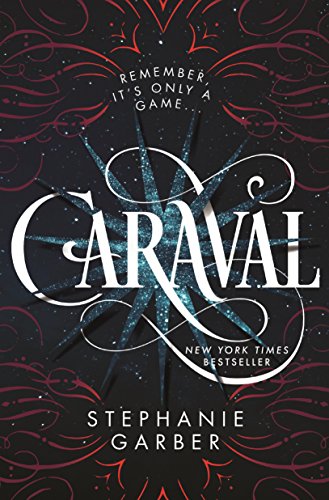 Stephanie Garber’s Caraval is a dazzling fantasy romance that will leave you breathless, but at its heart it’s about sisters. What we do for family. What we do to protect those whom we’ve loved and fought with and adored since birth. What that responsibility for another living soul can do to you and for you. Over the course of our lives together, my sister and I have switched bedrooms more times than I count, planned and participated in numerous talent shows in which we were the only talent (and mine was debatable), called one another names (we both a keen psychological instinct for hitting the weak spots), held and comforted the other, and hit one another with remotes (okay, that was just me. But she must have deserved it and afterwards she called me a “stupid ass” so we’re even). The point is: sisters are unlike anything on this earth. On one hand, she is a potential threat to your current happiness with her long memory and access to old Glamour Shot photos, but on the other, she is a living record of how you got to now, and your life-long best friend made flesh. Some of your quirks might really annoy the other (hello!, my sister is chronically late and I’m chronically sensitive) but you. don’t. ever. mess. with. my. sister. Garber captures this sisterly dynamic in Caraval with the Dragna sisters, both of whom are victims of their father’s abuse and long for escape. Scarlett has been attempting to protect her little sister Tella from their abusive father, the Governor of Trisda, since their mother disappeared. She believes that she’s finally found a permanent way to do it by marrying the Count, a man she’s never met before but who writes kind letters. Her sister sees their escape through Caraval, a magical competition orchestrated by a wizard named Legend. This year, the prize of Caraval is a wish. Scarlett’s always been drawn to the promise of Caraval’s magic but she resists her sister’s pleas to go there, until the matter is taken out of her hands and then Tella is kidnapped. As a result, Scarlett must navigate through the brilliant, dangerously unpredictable world of Caraval, searching for her beloved sister. As Scarlett attempts to solve the clues, this is what she knows to be true: she must rescue her sister Tella from kidnapping, she must leave Caraval in time to marry the Count, and she must resist Julian, her unreliable guide in Caraval, who seems to have some magic of his own. All the while, Scarlett must remember that she must not “let your eyes or feelings trick you,” and that there are consequences to losing and winning. Caraval is a book to enjoy in the moment, but it’s also a book to chew over. I find myself even now remembering certain parts of the book with the knowledge that I gained at the end, trying to put it all together and see the story from different points of view. And Scarlett is a character to admire: she pursues her sister through the terror and beauty of Caraval with ingenuity and aplomb. If you’re looking for an inventive tour de force, an explosion of color and sound, look no further. Admit your ticket to Caraval at the door and unlike Scarlett, don’t worry about allowing yourself to be “swept away.” Psssst! If you like Caraval, try: the sequels to the trilogy, including Legendary, book 2. Also, try The Hunger Games by Suzanne Collins and the movie Sing (hey, the stakes aren’t as big, but we’re still talking about competition here and what people want versus what they think they should do.) Maybe Erin Morgenstern’s The Night Circus—I read this years ago and think it’s time for a re-read. 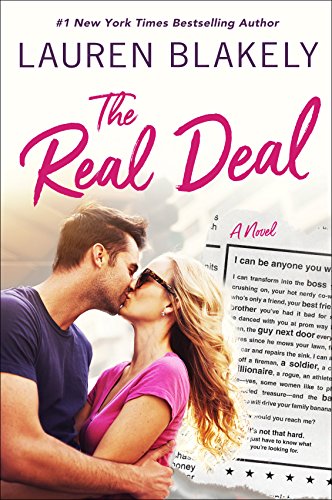 The Real Deal is meant for summer nights*. It’s full of family games and amusement park rides and a smooth crash into love, and as such, would be the perfect literary accompaniment to a sweating drink, a darkening sky, and a breeze stirring through the trees. Am I winning you over yet?, because this book clutched me by the heart and refused to let go. I was dazzled by April and Theo and their love story and the family members who love them but in the wonderful way of families, also drive them completely crazy. April Hamilton is up for a gig as the lead body painter for a major sports magazine’s body issue and she doesn’t want anything to get in the way, including her family’s repeated efforts to set her up and entice her to move back home to Wistful, Connecticut. Enter Theo Banks, a bartender and sometimes actor whom she hires as her completely platonic, bad boy boyfriend for the upcoming multi-day Hamilton Family Reunion. This job isn’t that difficult for him since Theo’s a good actor and also since IRL he’s done jail time and been a con man. But thankfully for us, Blakely offers romance novel catnip: Theo is a bad boy/reformed bad boy with a heart of gold. He takes on these occasional fake boyfriend jobs (which are always platonic, by the way) because he’s trying to pay off his brother’s debt without his brother knowing. Theo’s loyalty toward his brother means that he’s living paycheck to paycheck, and he also has zero interest in putting himself out there romantically again, but these are some other things you should know about him: he’s sexy, and has an amazing voice, and looks out for a teen living in his apartment complex, and drives a motorcycle with a snarling leopard on it. From the beginning, April and Theo are attracted to each other and they’re also delightfully compatible. The book feels cinematic in that way; there’s so much banter and it's suggestive of classic Hollywood. They verbally play off one another like improv masters. They create fake dates as part of their back story but we can see their investment in their fake love story and in their real one. Unlike other Blakely reads I've encountered, The Real Deal is set in a small town. It takes place largely outside of NYC, and it’s very family centered. It’s sweetness and nostalgia—do you remember the thrill of playing Twister or plummeting down a roller coaster? (I remember being bad at Twister and the last time I rode a roller coaster I literally thought I was going to throw up and then faint, all within a three second period, but I can still appreciate what Blakely’s doing here.) The superficial stakes might feel small—winning a family field day trophy and the prize money, which will presumably go toward charity but which Theo wants to use to finally pay off his brother's debt—but don’t be fooled: we’re really talking about whether April and Theo will decide that what they have is real and whether it’s worth fighting for. Whether they can appreciate where the other person has been—in Theo’s case, his con man past and how it threatens his present—and get past their relationship’s fake beginning. And along the way, we get Lauren Blakely’s fiction trademarks: a beautiful love story with humor, heart, and steammmmmmy (extra letters added for emphasis) sex. When you add a bad boy who is actually a really good person with characters who want to jump each other’s bones but who are also proud of the other’s achievements and a fascinating and lovable set of secondary characters, all set in sweet, sultry summer, I. am. all. in. Forever and ever amen. Pssssst! If you like this book, check out: Melanie Harlow’s If You Were Mine (another fake boyfriend/girlfriend book) and Jenny Holiday’s One and Only. I received a free copy of this book from Netgalley, but all opinions included are my own. *tell me more tell me more was it love at first sight. (Sorry, I couldn’t resist.) |
About me.Give me that HEA, please.
Join my mailing list.Want to receive a weekly email with links to my latest blog posts? Sign up below!
Archives
April 2024
Categories
All
|
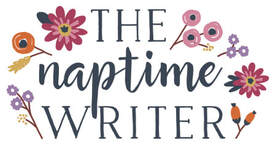
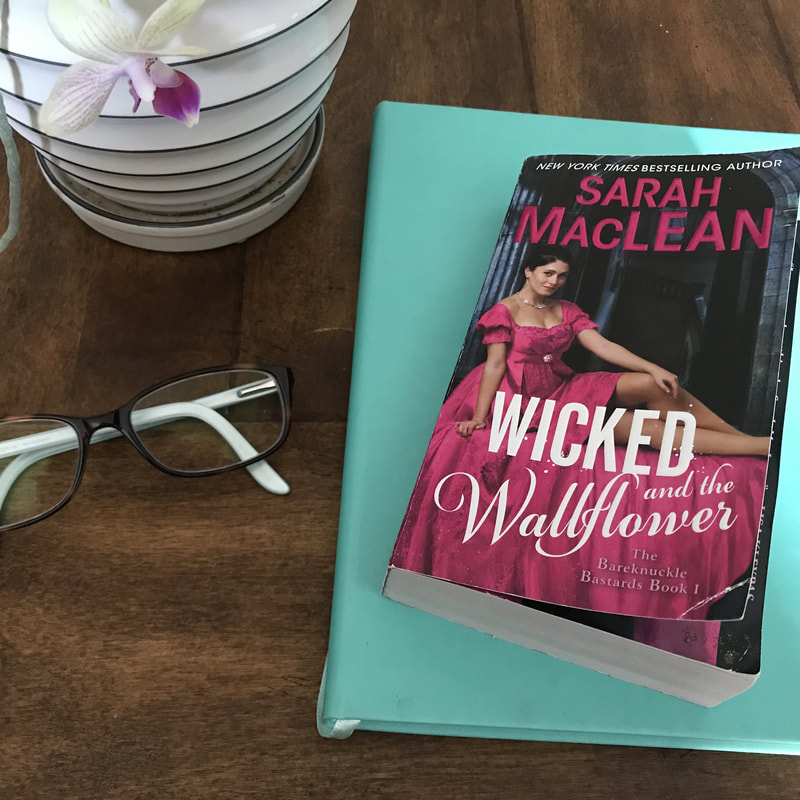
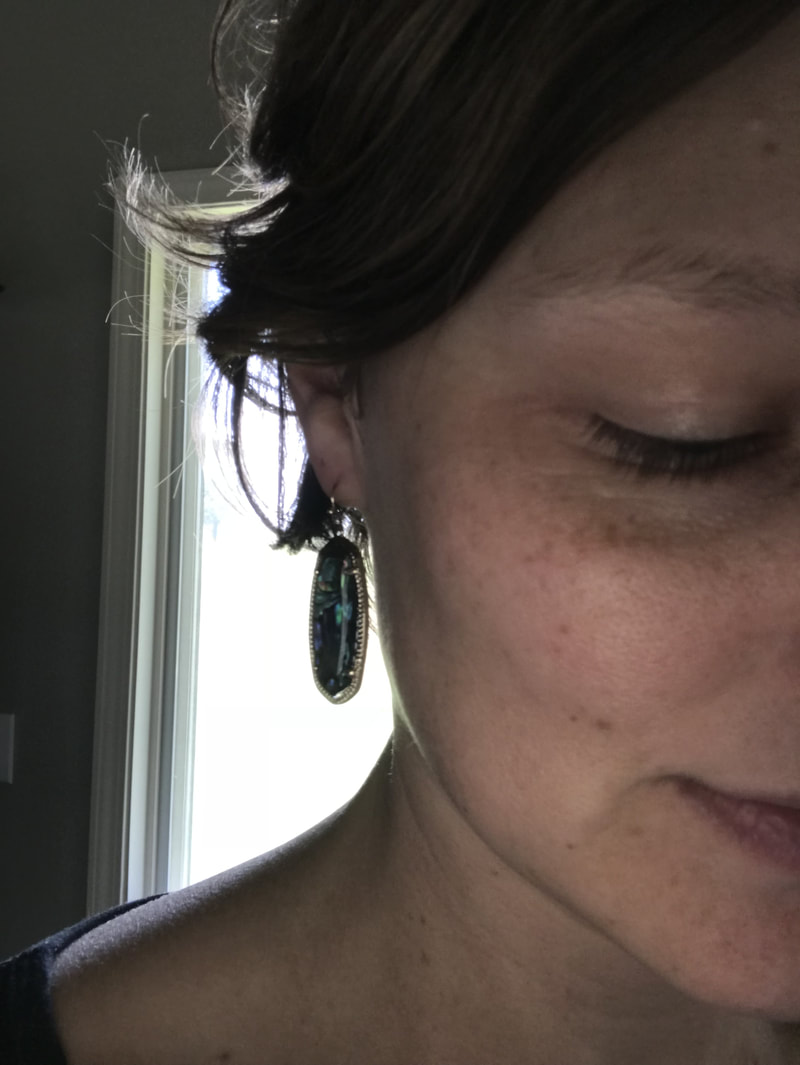



 RSS Feed
RSS Feed
